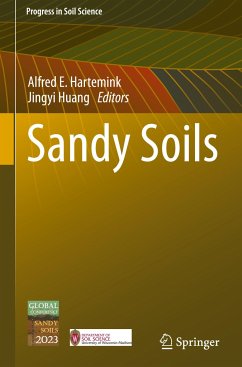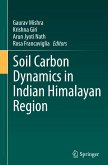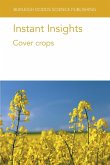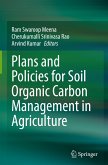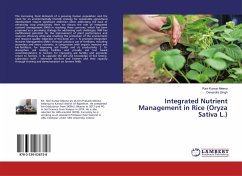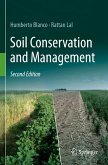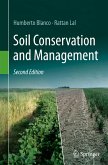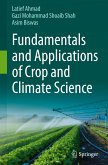Sandy Soils
Herausgegeben:Hartemink, Alfred E.; Huang, Jingyi
Sandy Soils
Herausgegeben:Hartemink, Alfred E.; Huang, Jingyi
- Gebundenes Buch
- Merkliste
- Auf die Merkliste
- Bewerten Bewerten
- Teilen
- Produkt teilen
- Produkterinnerung
- Produkterinnerung
Sandy soils cover approximately 900 million ha worldwide, and there are extensive areas of sandy soils under cultivation. Most sandy soils have high water permeability, low water-holding capacity, low ability to retain and exchange nutrients, weakly developed soil structure and they may be prone to erosion by wind. As irrigation is required for obtaining good crop yields, there is a risk of substantial leaching of nutrients and pesticides, and ground water depletion. Due to global pressure on land resources, marginal soils such as sandy soils are taken into production or cultivated more…mehr
Andere Kunden interessierten sich auch für
![Soil Carbon Dynamics in Indian Himalayan Region Soil Carbon Dynamics in Indian Himalayan Region]() Soil Carbon Dynamics in Indian Himalayan Region149,99 €
Soil Carbon Dynamics in Indian Himalayan Region149,99 €![Instant Insights Instant Insights]() Robert L. MyersInstant Insights64,99 €
Robert L. MyersInstant Insights64,99 €![Plans and Policies for Soil Organic Carbon Management in Agriculture Plans and Policies for Soil Organic Carbon Management in Agriculture]() Plans and Policies for Soil Organic Carbon Management in Agriculture153,99 €
Plans and Policies for Soil Organic Carbon Management in Agriculture153,99 €![Integrated Nutrient Management in Rice (Oryza Sativa L.) Integrated Nutrient Management in Rice (Oryza Sativa L.)]() Ravi Kumar MeenaIntegrated Nutrient Management in Rice (Oryza Sativa L.)26,99 €
Ravi Kumar MeenaIntegrated Nutrient Management in Rice (Oryza Sativa L.)26,99 €![Soil Conservation and Management Soil Conservation and Management]() Humberto BlancoSoil Conservation and Management75,99 €
Humberto BlancoSoil Conservation and Management75,99 €![Soil Conservation and Management Soil Conservation and Management]() Humberto BlancoSoil Conservation and Management97,99 €
Humberto BlancoSoil Conservation and Management97,99 €![Fundamentals and Applications of Crop and Climate Science Fundamentals and Applications of Crop and Climate Science]() Latief AhmadFundamentals and Applications of Crop and Climate Science75,99 €
Latief AhmadFundamentals and Applications of Crop and Climate Science75,99 €-
-
-
Sandy soils cover approximately 900 million ha worldwide, and there are extensive areas of sandy soils under cultivation. Most sandy soils have high water permeability, low water-holding capacity, low ability to retain and exchange nutrients, weakly developed soil structure and they may be prone to erosion by wind. As irrigation is required for obtaining good crop yields, there is a risk of substantial leaching of nutrients and pesticides, and ground water depletion. Due to global pressure on land resources, marginal soils such as sandy soils are taken into production or cultivated more intensely. Sandy soils - as a group of soils with specific characteristics and ecological limitations - have received limited research attention. This books presents the main papers from the Global Conference on Sandy Soils which was held in June 2023 in Madison, USA. This book focuses on novel and exciting aspects of research on sandy soils which is presented into three sections: Distributionand Assessment, Soil Carbon and Soil Health, and Water and the Environment. It presents a global glimpse on what recent progress has been in the study of sandy soil and their properties and management.
Produktdetails
- Produktdetails
- Progress in Soil Science
- Verlag: Springer / Springer Nature Switzerland / Springer, Berlin
- Artikelnr. des Verlages: 978-3-031-50284-2
- 1st edition 2023
- Seitenzahl: 352
- Erscheinungstermin: 2. Februar 2024
- Englisch
- Abmessung: 241mm x 160mm x 25mm
- Gewicht: 694g
- ISBN-13: 9783031502842
- ISBN-10: 3031502841
- Artikelnr.: 69349206
- Herstellerkennzeichnung
- Springer Nature c/o IBS
- Benzstrasse 21
- 48619 Heek
- Tanja.Keller@springer.com
- Progress in Soil Science
- Verlag: Springer / Springer Nature Switzerland / Springer, Berlin
- Artikelnr. des Verlages: 978-3-031-50284-2
- 1st edition 2023
- Seitenzahl: 352
- Erscheinungstermin: 2. Februar 2024
- Englisch
- Abmessung: 241mm x 160mm x 25mm
- Gewicht: 694g
- ISBN-13: 9783031502842
- ISBN-10: 3031502841
- Artikelnr.: 69349206
- Herstellerkennzeichnung
- Springer Nature c/o IBS
- Benzstrasse 21
- 48619 Heek
- Tanja.Keller@springer.com
Alfred Hartemink is professor of soil science at the University of Wisconsin - Madison. He was trained in pedology and soil fertility, and his research focuses on novel ways to explore the soil profile, and the management of soil carbon in natural and agricultural ecosystems. Before his current position, he was for 12 years at ISRIC-World Soil Information in the Netherlands and between 1987 and 1999, he worked at research institutes and universities in Tanzania, Congo, Indonesia, Kenya, Papua New Guinea, and Australia. Alfred has written several books. Jingyi Huang is an professor in the Department of Soil Science, University of Wisconsin-Madison. He is internationally recognized for developing sensor-model integration frameworks to characterize the spatial and temporal variations of soil from the field to global scales and model soil-plant-atmospheric interactions under climate change and human disturbance. Jingyi is an Early Career Fellow of the Soil Science Society ofAmerica (SSSA) and provides leadership for several soil committees in SSSA, American Society of Agronomy, and American Geophysical Union. He serves as an associate editor for Geoderma and Soil Science Society of America Journal.
Part 1. Distribution and assessment.- 1. Sandy Soils of the World: Taxonomy, Geography, and Soil Conditions (Jim Bockheim).- 2. Origin and Properties of Deep Sands of South-Eastern Cambodia - Some Preliminary Findings (S. Hin, R.W. Bell, D. Newsome, W. Vance, V. Seng).- 3. Sandy Soils in the USA: Properties and Use (R.R. Dobos, S. Kinast-Brown, S. Roecker, D.L. Lindbo).- 4. Molic and Umbric Horizons of Alluvial Sandy Soils of River Valleys in SW Poland (Beata Labaz, Cezary Kabala).- 5. Properties and Mid-infrared Spectral Signatures of Sandy Soils in Ghana (Stephen Owusu, E. Micheli, Edward Yeboah, C. M. Ocansey., A. Csorba).- 6. Spectroscopy Supported Definition and Classification of Sandy Soils in Hungary (Erika Michéli, Márta Fuchs, Yuri Gelsleichter, Mohammed Zein, Ádám Csorba).- 7. Proximal Sensing in Soil Water Repellency Management: A Review (Maria Then, Craig Lobsey, D.J. Henry, S. Sochaki, Richard Harper).- 8. Comparing Sand Content Measurements by the Pipette, Hydrometer,and vNIR and MIR Spectroscopy (Annalisa Stevenson, Alfred E. Hartemink, & Yakun Zhang).- 9. Aeolian Desertification Monitoring in the Sandy Areas of Northern China (Liu Shulin, Wang Tao, Song Xiang, Kang Wenping).- 10. Some Characteristics of Sandy Plaggen Soils (J.L. Yost, Alfred E. Hartemink).- Part 2. Soil Carbon and Soil health.- 11. Enhanced Weathering to Enhance Carbon Sequestration in Sandy Soils (Ryan E. Champiny, Yang Lin).- 12. Soil Carbon in Sandy Soils under Forest and Agriculture in Wisconin, USA (Annalisa Stevenson, Yakun Zhang, Jingyi Huang, J. Hu, Alfred E. Hartemink).- 13. Fallow Band System for Improving Crop Production on Sandy Soils in the Sahel (Kenta Ikazaki, Hitoshi Shinjo, Yuko Sasaki, Ueru Tanaka, Satoshi Tobita, Dougbedji Fatondji, Shinya Funakawa, Takashi Kosaki).- 14. A Simple Way to Illustrate Health of Soils in Sandy Golf Course Greens (Jason Eberhard, Barry Stewart, J. Brooks, J.D. McCurdy).- 15. Agricultural use of Sandy Soils in Brazilian Cerrado (Brazilian Savanna) (Flávia Cristina dos Santos, J.H. Moreira Viana, M. Augusto Batista, A. Vilela de Resende, M.R. de Albuquerque Filho).- 16. Leaf Litter Decomposition and Nutrient Release Dynamics in a Sandy Loam Tropical Paleudults in The Enugu area, Southeast Nigeria (M.A.N. Anikwe, I.J Chidobem, I.E. Eze).- 17. Reforestation of Sandy Soils in the Tohoku Sea Coast of Japan (M. Kawahigashi, T. Kajiwara).- 18. Soil Management Practices to Reduce Hardpans and Compaction in Sandy Soils of North Carolina, USA (Alam Ramirez Reyes, Josh Heitman, Michael Vepraskas, and Ekrem Ozlu).- 19. Ameliorating Sandy Soil Constraints for Productivity Gains in Southern Australia (T. McBeath, M. Unkovich, J. Ouzman, R.C. da Silva, M. Moodie, Mel Fraser, C. Saunders, J. Desbiolles).- 20. Compost Application Leads to Higher Nitrification Rates and N2O Emissions in Sandy Soils (X. Zhu Barker).- 21. Characterization of Phosphorus Sorption of Some Sandy Soils in Florida with Microscopy and Computer Vision (P. Mungofa, L. Waldo, and A. Schumann).- Part 3. Water and the Environment.- 22. Localized Dry Spot Recovery and Water Repellency in a Sand Golf Green (Cale A. Bigelow, Jada S. Powlen, Stanley J. Kostka).- 23. Irrigation Practices Enhance Water Management of Citrus on Sandy Soil in Florida (Alisheikh A. Atta, Kelly T. Morgan, Said A. Hamido, and Davie M. Kadyampakeni).- 24. Soil Water Repellency in Sandy Soils - a Review (M.T.T. Dao, Bernard Dell, David Henry, R.J. Harper).- 25. Soil Water Repellency in Reforested Sandy Soils (Edyta Hewelke, Jerzy Weber, Lilla Mielnik, Ewa B. Górska, Dariusz Gozdowski, Piotr T. Zaniewski, Piotr Hewelke).- 26. High-resolution Soil Moisture Mapping using Sentinel-1 and Moisture Probes in Cultivated Sands (Jingyi Huang, Alfred E. Hartemink, Francisco Arriaga, Nathaniel W. Chaney).- 27. Some Current and Emerging Environmental Issues in Sandy Soils (Jingyi Huang, Alfred E. Hartemink).- Part 4. Epilogue.- 28. Sandy Soils: do we know Enough? (Yakun Zhang, Jingyi Huang, Alfred E. Hartemink).- 29. Sandy Soil Proverbs and Names from the Netherlands (Alfred E. Hartemink).
Part 1. Distribution and assessment.- 1. Sandy Soils of the World: Taxonomy, Geography, and Soil Conditions (Jim Bockheim).- 2. Origin and Properties of Deep Sands of South-Eastern Cambodia - Some Preliminary Findings (S. Hin, R.W. Bell, D. Newsome, W. Vance, V. Seng).- 3. Sandy Soils in the USA: Properties and Use (R.R. Dobos, S. Kinast-Brown, S. Roecker, D.L. Lindbo).- 4. Molic and Umbric Horizons of Alluvial Sandy Soils of River Valleys in SW Poland (Beata Labaz, Cezary Kabala).- 5. Properties and Mid-infrared Spectral Signatures of Sandy Soils in Ghana (Stephen Owusu, E. Micheli, Edward Yeboah, C. M. Ocansey., A. Csorba).- 6. Spectroscopy Supported Definition and Classification of Sandy Soils in Hungary (Erika Michéli, Márta Fuchs, Yuri Gelsleichter, Mohammed Zein, Ádám Csorba).- 7. Proximal Sensing in Soil Water Repellency Management: A Review (Maria Then, Craig Lobsey, D.J. Henry, S. Sochaki, Richard Harper).- 8. Comparing Sand Content Measurements by the Pipette, Hydrometer,and vNIR and MIR Spectroscopy (Annalisa Stevenson, Alfred E. Hartemink, & Yakun Zhang).- 9. Aeolian Desertification Monitoring in the Sandy Areas of Northern China (Liu Shulin, Wang Tao, Song Xiang, Kang Wenping).- 10. Some Characteristics of Sandy Plaggen Soils (J.L. Yost, Alfred E. Hartemink).- Part 2. Soil Carbon and Soil health.- 11. Enhanced Weathering to Enhance Carbon Sequestration in Sandy Soils (Ryan E. Champiny, Yang Lin).- 12. Soil Carbon in Sandy Soils under Forest and Agriculture in Wisconin, USA (Annalisa Stevenson, Yakun Zhang, Jingyi Huang, J. Hu, Alfred E. Hartemink).- 13. Fallow Band System for Improving Crop Production on Sandy Soils in the Sahel (Kenta Ikazaki, Hitoshi Shinjo, Yuko Sasaki, Ueru Tanaka, Satoshi Tobita, Dougbedji Fatondji, Shinya Funakawa, Takashi Kosaki).- 14. A Simple Way to Illustrate Health of Soils in Sandy Golf Course Greens (Jason Eberhard, Barry Stewart, J. Brooks, J.D. McCurdy).- 15. Agricultural use of Sandy Soils in Brazilian Cerrado (Brazilian Savanna) (Flávia Cristina dos Santos, J.H. Moreira Viana, M. Augusto Batista, A. Vilela de Resende, M.R. de Albuquerque Filho).- 16. Leaf Litter Decomposition and Nutrient Release Dynamics in a Sandy Loam Tropical Paleudults in The Enugu area, Southeast Nigeria (M.A.N. Anikwe, I.J Chidobem, I.E. Eze).- 17. Reforestation of Sandy Soils in the Tohoku Sea Coast of Japan (M. Kawahigashi, T. Kajiwara).- 18. Soil Management Practices to Reduce Hardpans and Compaction in Sandy Soils of North Carolina, USA (Alam Ramirez Reyes, Josh Heitman, Michael Vepraskas, and Ekrem Ozlu).- 19. Ameliorating Sandy Soil Constraints for Productivity Gains in Southern Australia (T. McBeath, M. Unkovich, J. Ouzman, R.C. da Silva, M. Moodie, Mel Fraser, C. Saunders, J. Desbiolles).- 20. Compost Application Leads to Higher Nitrification Rates and N2O Emissions in Sandy Soils (X. Zhu Barker).- 21. Characterization of Phosphorus Sorption of Some Sandy Soils in Florida with Microscopy and Computer Vision (P. Mungofa, L. Waldo, and A. Schumann).- Part 3. Water and the Environment.- 22. Localized Dry Spot Recovery and Water Repellency in a Sand Golf Green (Cale A. Bigelow, Jada S. Powlen, Stanley J. Kostka).- 23. Irrigation Practices Enhance Water Management of Citrus on Sandy Soil in Florida (Alisheikh A. Atta, Kelly T. Morgan, Said A. Hamido, and Davie M. Kadyampakeni).- 24. Soil Water Repellency in Sandy Soils - a Review (M.T.T. Dao, Bernard Dell, David Henry, R.J. Harper).- 25. Soil Water Repellency in Reforested Sandy Soils (Edyta Hewelke, Jerzy Weber, Lilla Mielnik, Ewa B. Górska, Dariusz Gozdowski, Piotr T. Zaniewski, Piotr Hewelke).- 26. High-resolution Soil Moisture Mapping using Sentinel-1 and Moisture Probes in Cultivated Sands (Jingyi Huang, Alfred E. Hartemink, Francisco Arriaga, Nathaniel W. Chaney).- 27. Some Current and Emerging Environmental Issues in Sandy Soils (Jingyi Huang, Alfred E. Hartemink).- Part 4. Epilogue.- 28. Sandy Soils: do we know Enough? (Yakun Zhang, Jingyi Huang, Alfred E. Hartemink).- 29. Sandy Soil Proverbs and Names from the Netherlands (Alfred E. Hartemink).

